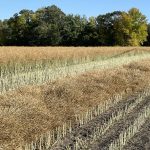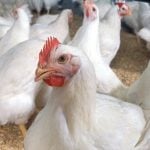Southern Alberta’s agriculture industry has long been rooted in the resilience and innovative nature of its farmers and ranchers.
They have been admired for their creative problem-solving for more than a century and today even more inventive, and sometimes futuristic, agriculture technology (ag tech) solutions are emerging. Farmers, ranchers and the entire agribusiness industry in southern Alberta are embracing advanced technology to solve problems.
Ag tech is the umbrella term for innovative solutions in the food-production process, notably in the form of precision farming for efficiency, improving food safety, taking the guesswork out of food production and in turn making the entire process more sustainable and cost-effective.
The sector’s long-term growth is tied to the need to keep pace with the demand to feed a world population of more than seven billion. That global challenge is presenting opportunities for more investment and room for innovation.
At their core, ag tech solutions are helping southern Alberta farmers to mitigate risk, boost productivity and create more value for consumers. By adopting advanced technologies and adapting to change, the sector is growing as one of southern Alberta’s key economic drivers. Agribusiness is positioning the province to compete internationally and ensure long-term stability and growth for the industry and its workers.
An opportunity-rich province and industry
Alberta’s agriculture products are exported to more than 150 countries, with exports more than doubling over the last 10 years. The industry in Alberta also now accounts for more than 21 per cent of all Canadian agri-food exports, contributes $9.2 billion in gross domestic product and employs more than 77,000 Albertans.
With this economic clout, combined with the rich farmland and an innovator mindset, Calgary and southern Alberta are set to build on their success in ag tech — an industry set to be worth $US730 billion worldwide by 2023.
In an Agribusiness Market Study published by Calgary Economic Development in collaboration with Western Economic Development Canada, the food, beverage and meat-processing sector is anticipated to have an estimated global market size of $US4.1 trillion by 2024, representing a compound annual growth rate (CAGR) of 4.3 per cent from 2019 to 2024.
Here at home, agriculture is integral to the Canadian economy, generating more than $112 billion in production value and contributing $28.5 billion to Canada’s GDP.
Technological innovations have helped farmers do more with less, increase efficiency, and reduce their environmental impact. The technology continues to improve farmers’ bottom line and contributes to their increasing yields sustainably.
With ag tech critical to the agribusiness industry, attracting tech entrepreneurs and emerging talent to the agribusiness ecosystem is key to its growth. With the low cost of doing business and a quality of life bolstered by one of the most affordable housing markets in North America, Calgary has a lot to offer.
The Economist Intelligence Unit ranks Calgary the most liveable city in the Western Hemisphere, and fourth globally. It’s been in the top five for a decade.
“As the most livable city in North America it gives us many competitive advantages,” said Mary Moran, President and Chief Executive Officer of Calgary Economic Development. “The growth we’ve seen in the agriculture sector has been great for the province. We are really focused on agribusiness value addition and ag tech, and have been making significant advancements in that.”
Advanced technology grown in Alberta
Southern Alberta is also home to the Olds College Smart Farm, the base for a new farming operation being transformed by Olds College to become a living and working lab for smart agriculture.
Organizations of all sizes from startups to multinational corporations have partnered with Olds College in this cutting-edge, hands-on learning environment where students are seeing how the innovative solutions they help create are making a real-world impact.
Olds College also launched the Werklund School of Agriculture Technology, which is fostering the next generation of agricultural innovators. Providing students with the foundation for a future-focused career in agriculture, the school will deliver new ag tech programs including the Precision Agriculture – Techgronomy Diploma and Agriculture Technology Integration Post-Diploma Certificate.
In 2020, the Canadian Agri-Food Automation and Intelligence Network announced its first open call for research and innovation projects to accelerate the adoption of smart agricultural practices in Canada. The $15 million call from the network will focus on automation and digital technology opportunities that contribute to advancing the agri-food sector.
“Investment and learning opportunities, as well as access to business support, are key to the formation of successful ag tech solutions,” said Moran, who believes initiatives like these are the best way to see more success stories come out of the Alberta agriculture industry, and Canada-wide.
Decisive Farming is one example. The Alberta business is empowering farmers with a complete solution for their farm’s ecosystem, using information-capture technology that informs decision-making and creates efficiencies through time-saving applications and streamlined communication processes.
The company’s platform, developed by Remi and Tasha Schmaltz, gives farmers a single location to access and control all their information, and help them make better-informed decisions for their farm. To add to its success story, Decisive Farming was acquired by TELUS in 2019, and is part of its new global business unit focused on transforming the food value chain.
Innovation like this has helped Alberta’s agribusiness sector grow and compete in the global marketplace. Farmers can now use technological solutions such as advanced sensors, imaging, remote monitoring, automation and robotics.
Precision farming, through the use of information technology, enables farming practices to be more accurate. Automated equipment, sensors, and drones provide farmers with real-time pictures and updates on crop yield. All of these solutions and more are transforming and advancing modern farming.
A tech talent hub
Many variables, especially inconsistent and fluctuating weather, can play a factor in farming success. Technology, especially artificial intelligence (AI), plays an important role with solutions to lower costs and improve crop yields by tracking weather and allowing farmers to assess and plan for risk. Globally, AI in agriculture is expected to grow 25 per cent per year through 2025.
By harnessing AI and digital technology to solve problems such as safe and secure food production, Calgary is becoming a hub for emerging technologies, and it is thanks to being home to one of the highest concentration of high-tech workers among Canadian cities.
While Calgary already boasts a burgeoning tech ecosystem, finding and attracting tech talent is still key to the ag tech sector planting the right seeds for growth.
“Our culture here in Calgary and Alberta is perfect for embracing advanced technologies and innovations in the ag tech sector. We can sense the province and sector’s excitement about its potential, and we can’t wait to see who joins us here to add even more ag tech bench strength,” Moran added.
The province with potential
While Calgary and southern Alberta have been producing food for Canada and beyond for over a century, it’s undeniable how far Alberta has come in the agriculture and agribusiness sectors thanks to advancing technologies and innovations.
As a leading centre for agriculture business knowledge, with world-class academic and research institutions and a legendary entrepreneurial spirit, there are immense opportunities in Calgary to maximize food output and be a global hub for sustainable agricultural technology.
With the low cost of doing business and a quality of life bolstered by one of the most affordable housing markets in North America, Calgary has a lot to offer.










